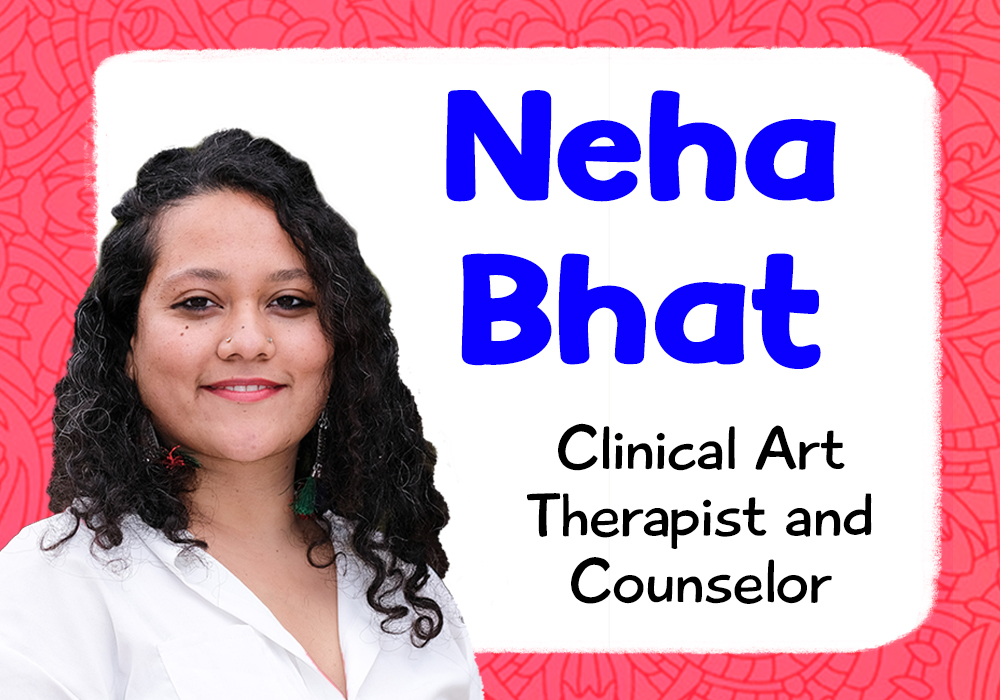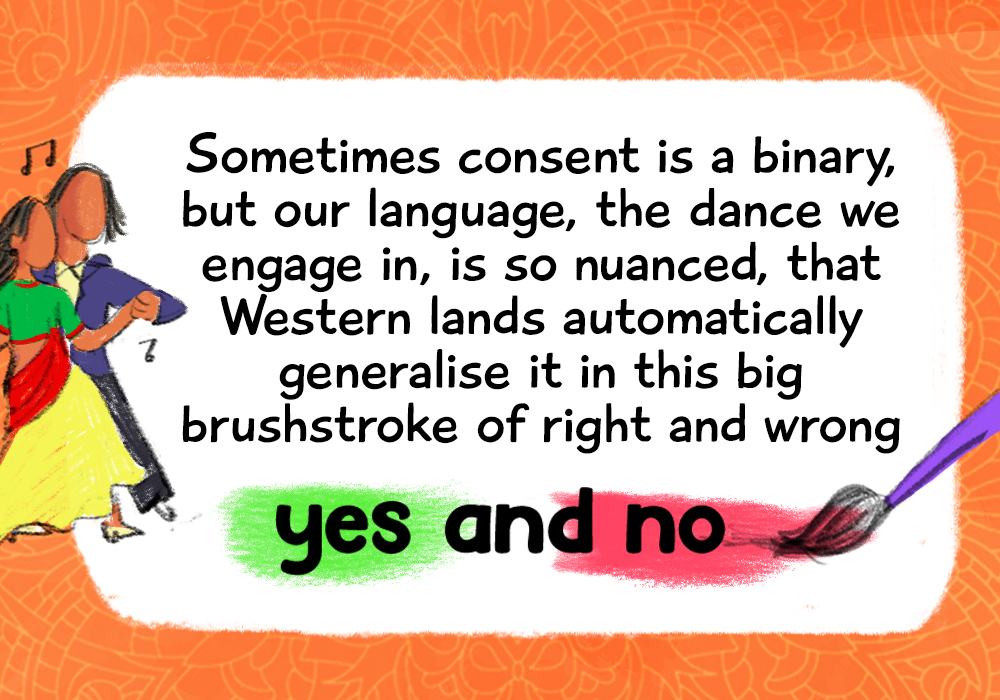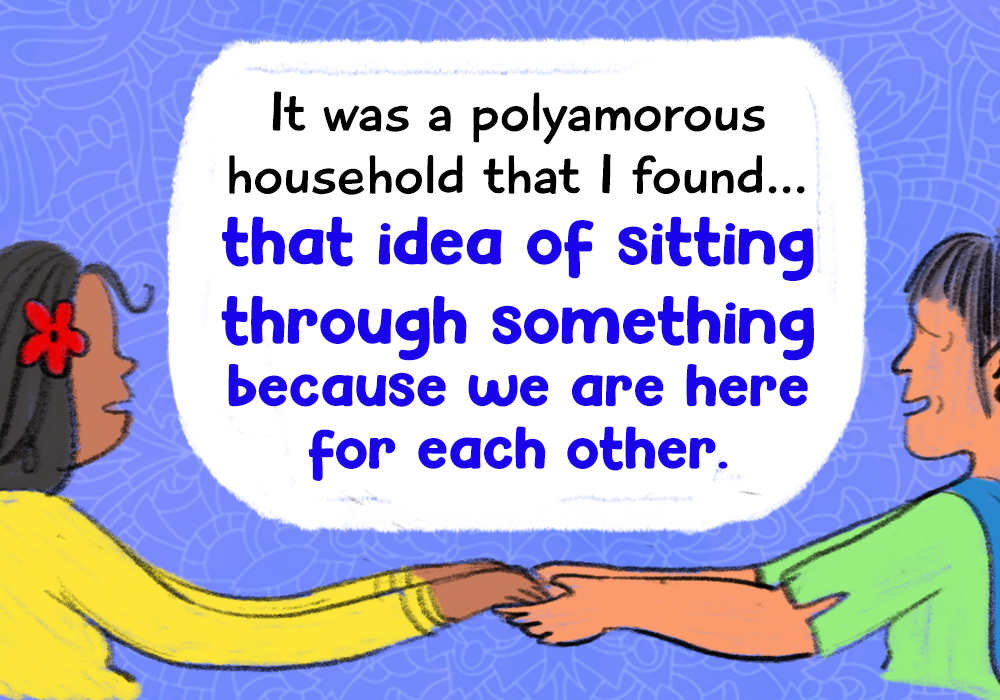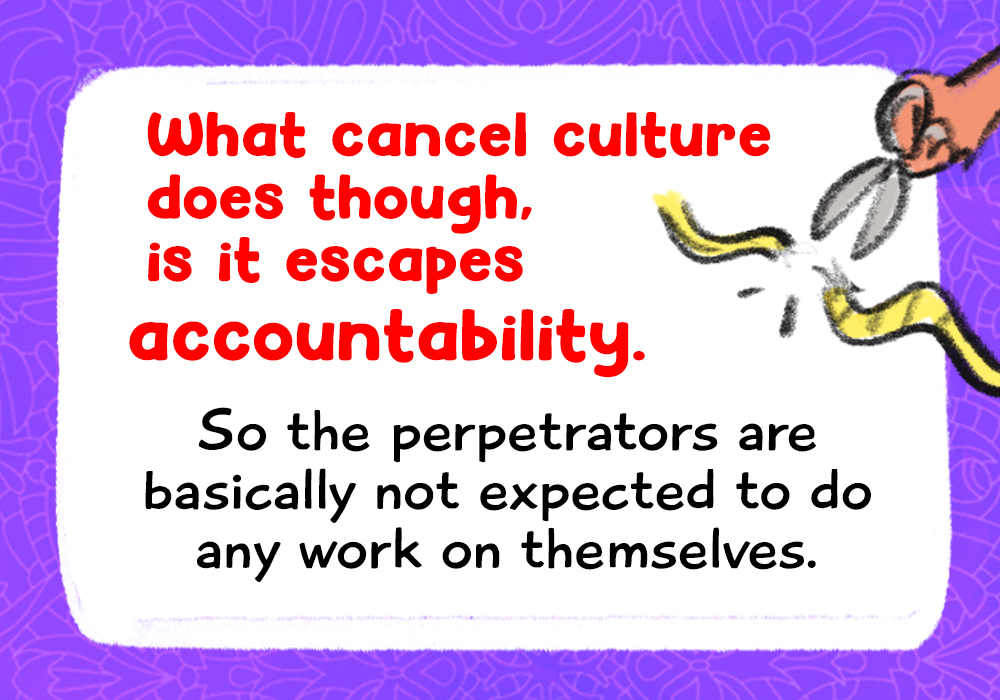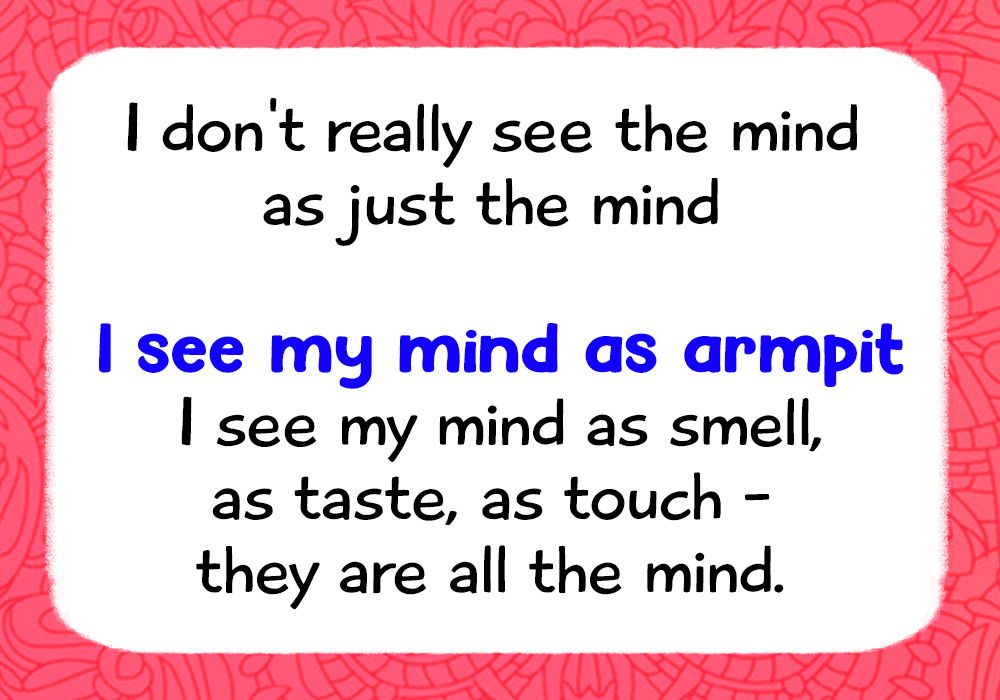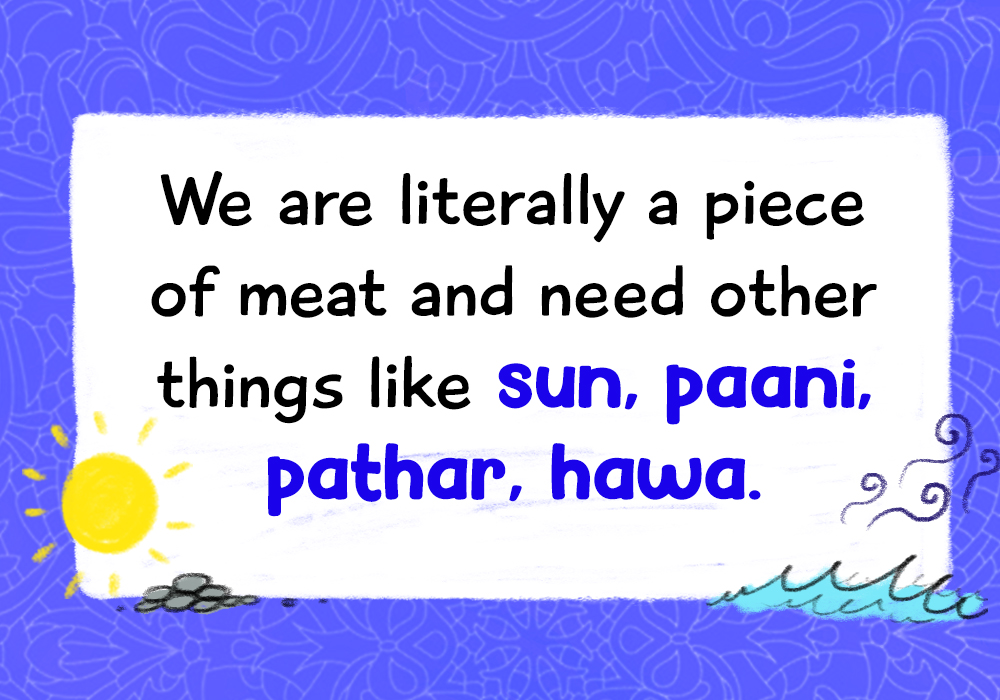Excerpts from an interview with Paromita Vohra, Founder of Agents of Ishq, during our 2020 Sharbati Shaam sessions:
PV: We often find there are so many misconceptions about mental health professionals. What is the difference between being a therapist, which you are, and being a psychiatrist?
NB: There is a whole stigma attached to receiving help. There is the stigma that has come from Hollywood; unfortunately, our media culture and what we consume has come from a certain brand of medical help. The medical model is the allopathic, Western medical model, which is based on diagnosing someone and giving them medicine. That is institutional psychiatry.
The expectation is you will sit there for 15 minutes, say what’s up with you and describe your symptoms. The psychiatrist will give you a clinical diagnosis, and then prescribe you a medicine which your insurance will pay for.
Going to a psychologist or therapist is very different from going to someone for 15 minutes. An average session with the therapist, or someone like me, is for like an hour or two sometimes. And, you’re in a long-term relationship with the person. Therapy is like dating but without the stakes–there’s no sex and there’s no big heartbreak if it’s done well.
In India, because we were colonised, we copy those models that came to our hospitals and we create allopathic models of care, which psychology and therapy is also a part of. Therapy needs to be decolonised.
PV: That’s something AOI Is also very committed to–finding a desi, context-rich language to convey experiences. What do you mean when you say decolonising therapy, and making therapy desi?
NB: You [AOI] are building a platform for decolonising pleasure languages, sex languages, that says, “Look, there is not just a binary idea of sexuality that exists. There are so many nuances that get missed out because we don’t have shows that show us that.”
For instance, my idea of consent when I came to the US was very nuanced, very different from the American idea. Sometimes consent is a binary, but our language, the dance we engage in, is so nuanced, that the Western lands automatically generalise ambiguities into this big brushstroke of right and wrong.
The binary of consent is a part of feminism that is white, and a part of second wave feminism; contemporary feminism includes men, trans people, trans men. The definition of consent is much more nuanced.
There’s no one way to answer what decolonial therapy is. Every practitioner will come up with their own answer, depending upon their upbringing, value systems and ideas. So, when we say individualism is a part of white culture, I didn’t come up with this, the African American museum in DC did.
I have struggled between the US and India, and my own colonisation and colonial practice for 12 years. There is this expectation that we have to normalise our mental health in terms of what America thinks is normal and the problem is so much bigger than the language. It’s to do with class structures, pornography.
There is a very boxed idea of what is right, and what is wrong within mental health. So, your idea of support is to go to this third person outside the family, get help and then stay outside the family.
For example, say your mother is coming to visit you and is staying with you for 7-10 months. A white therapist is conditioned to pathologise that as an enmeshment. You’re really close to your mother and you’re 40 years old and there’s some problem with this. So, the solution is go live in an apartment and figure out your boundaries, and those boundaries have to be really intact because if you’re not going to maintain those boundaries well, it means you are enmeshed.
Now, to label an entire culture enmeshed because of this one idea of what a healthy family looks like, is colonised therapy. So, decolonised therapy, for me, is looking at it as an Indian.
I will not allow religion to not have space within a therapeutic lens or framework. I will include another person’s religious beliefs and biases, and explore that within therapy and see how your religious ideas impact what closeness is and what closeness isn’t. Where does it come from, who do you go for help, do you go to your priest, mullah? What does that help look like, who can I empower in your world to help you better?
The westernised world is waking up now to the idea of relational therapy. Which is part of who we are as Indians.
In India, there is not a cultural expectation to meet a friend after making a call and waiting for an appointment. Here, it’s chai leke aa jao, hum gup shup karenge. It’s not considered rude if you stay five minutes longer, or extend a little bit because it’s the idea of interdependence which is somehow culturally there, in the lived experience in India.
That experience does not exist in white communities, but in Latino and black and Asian communities and Europe it does. It’s just not been written about. So, decolonising therapy is decolonising our bookshelves, rewriting what kind of cultural experiences there are. You have to work with them and not continuously put them in binary boxes of right vs. wrong.
PV: Does decolonising therapy move beyond the didactic relationship of the therapist and the client?
NB: That’s really the point of it: to integrate it into the sources of strength the person has. That is the point of community feminist relational therapy which is the root of a lot of Dalit feminist work that has always happened in this country. It is a part of Savitribai Phule’s work; the foundation for something safe, relational, where you relearn some of the ways you may have been fucking up in your life, or you don’t realise you are.
Some people come back to me after years. They say that [the work earlier] really helped them, and they are in a different place in their life now. They need somebody who knew them from before to help them. I will not say “no” to that person coming back. Western models, based on insurance and other things, may have to decline somebody for certain reasons.
Relational therapy and decolonised psychology questions the idea of the practitioner as the expert. There is a relationship between the practitioner and the client and that relationship itself is revolutionary, because it opens up the client’s mind and it opens up the therapist’s mind and takes us to places where we didn’t expect to go, as opposed to if you had come to me as the only one holding the power of knowledge.
Another example: at domestic violence shelters, there is this idea of mental health people as judgemental experts who will come and tell you this is what’s working and this is what isn’t.
In a domestic violence case I had, a client was getting punched by her husband for months. A lot of therapists tried a lot of different techniques where they asked her to leave him. But there’s a history there, and because this person was from an Indian context, there were so many layers of why that person was staying. The husband was a loving man and yet suffered with this abusive side that came out every Sunday.
For years, she struggled because there was a judgement attached by therapists, which also paralysed her. Until she found a team of people who shared her background. We asked what she needed.
She said, “I am not going to be able to leave him because I have no support. If you call the police, I will get deported.” So, we planned with her, asking what she thought would work. She said, “I need him to stop punching me”. But the only way to do that was to get him to punch her so much, she would end up in the hospital and the hospital would be an escape, because we would be there and take the children away. If you look at it, we basically asked the guy to up his violence on the client, cause harm, and then we provided an escape. She said that’s what would work. We respected her understanding instead of imposing our idea of right and wrong, and it did work. She’s in a different relationship now and she’s fine.
PV: When we at AOI talk about this idea of something that is desi, we think of it as something that is inherently queer, which is not necessarily falling into one or the other category but proceeding in a more heterogeneous way. What do you think this can give young people today?
NB: I identify as queer: queer sexually and in my gender identity. I am a bisexual person who came out at 13. I stayed with that. I fought a lot with my own community and I still do, but that’s the relationship we all have, we all have contradictions within ourselves. The one thing that straight culture did not teach me is how to repair, and how to sit with difficult things when they happen. It taught me to leave because the binary was there for that reason: somebody’s abusing you, you leave. And it starts to become very blanket.
I see that repeating now, and Gen Z specifically, has been doing this very much with cancel culture.
That makes sense for an entity and big sources of power (like a corporate), but not always as much in interpersonal relationships. In a relationship between a mother and a daughter, a conflicting relationship, there is a power that the child exercises over the mother too who continues to stay, for instance.
I only learnt how to sit with these difficulties in a queer space. I was a baby lesbian who was held by older lesbians platonically, and taught this is how you don’t leave.
It was a polyamorous household that I found this in. It was so normal for me that it was only in my 20s, I realised the whole world is not like this! But that idea of sitting through something because we are here for each other, you’ve said something which I may not agree with, but you’re older than me. You’re an older lesbian and I’m a younger lesbian. You are not going to throw me out. You are going to sit with me and confront my problems. That may be emotionally laborious to you, but you will do it because we are a part of a community. There was a sense of that. The younger generation is missing that, they’ve become so okay with texting when we have a conflict with someone.
Therapy will not solve this for you, you will learn in therapy and then you have to go out and apply the skills and come back and work with me on what did or didn’t work. That is community psychology. I worked with many different community organisers to say “let’s talk about how conflict can be aired out, maybe you can’t resolve it, but at least let’s bring it out here and not just leave it to unread messages”.
PV: But what about relationships that truly are toxic? How long should we engage with them?
NB: I agree with you that sometimes liberation for me is to realise that because I did the relational work, and I did it at the right time with the person who hurt me, now it is no longer my responsibility to go and make myself accountable. And so, you see this is a part of decolonisation. Just because you’re a part of a culture which is relational, doesn’t mean you’ve to take everything relational from it.
Sometimes, Indian culture would say that you’ve to sit with that argument until death. That’s also too much. Because that’s the expectation, that you don’t say anything to that abusive uncle. And when you grow up, you’ve to just actually ignore that part. Because that is what culture would teach you, because you have to invite them to your wedding.
I think it’s very interesting that it’s happening in our community, the Black feminist community, the Latinex community. That we can choose what works for us. That’s why I label my practice as Urban Indian, not rural Indian, because I don’t know anything about that.
Because, sometimes, the labelling of what’s toxic and not toxic is to do with our internalised sense of morality and sometimes that sense of morality may not come from inner experience, or what we actually want!
If we think about sexual violence, which is the area I work in, there’s an idea that all “survivors of violence need to hate their perpetrators” because if you don’t hate [them], that means your trauma isn’t valid: “why did you go back to them” “why do you continue to chat with them”, or “why do you sit in the car with them when they were apologising to you”.
So, that is a kind of enforcing the notion of cancel culture: cancel them out of your life. What cancel culture does though, is it escapes accountability. So the perpetrators are basically not expected to do any work on themselves.
PV: I find this idea compelling. That when there’s cancel culture, the perpetrator has no accountability. It’s something I hear my feminist friends discussing at varied moments. As we debate the worth of cancelling, or focus on an idea of punishment, it ends up being that men (in particular or general) are not the ones we hold accountable as much as we judge and cancel each other in disagreement or divergence as feminists.
NB: To ride on what you’re saying, the idea of meanness not being away from the idea of love, you know? If I love you, I can be angry with you, no? That means, I’m angry with you, I care about you. I’m allowed to be both. And, if you love me, you should hold all. You shouldn’t get away from me.
So, let me just share with you an institution’s example.
At the University of Michigan, I got to be a part of the restorative justice department. That is the only institution in the world which doesn’t incarcerate perpetrator students, automatically. There, my job was something called “Adaptable Resolution”, and we had to ask the survivors what they wanted. Sometimes, the survivor would want an apology letter, sometimes they want to yell or unidirectionally talk to the perpetrator, in one room and the person has to listen. And, because the whole institution holds both people’s degrees, we could experiment with so many different resolutions.
Restorative justice is not free from problems but, it was this nuanced space of saying “Oh, ok. I can actually talk back even though you did this thing to me and you are going to be held accountable by the institution”.
PV: There was a question from the audience: do you feel that a very westernised form of queer identity politics, with a heavy focus and labels, can affect the way a queer person feels deeply? Do you have any tips on how to deal with that?
NB: Yeah absolutely, because it reinforces the sense of right and wrong. There is politics where that label lies. There’s history to those politics and that history helps us make sense of why people want what they want. Why they want a separate label and [why] they want people to identify themselves with that label. I make a distinction. Externally, I will allow myself to do what is required of me which may have to be politically correct, which I am not in my mind, in my mental space.
For example, the word bisexual. I use it in the Indian context. The very specific reason I don’t use queer because here for me the label doesn’t tell me what I really am. I may be a hippie queer artist and what not, but I am not that. I am someone who likes specifically identified feminine bodies and specifically masculine identified bodies, and I have a dichotomy in there that gets invisiblised within the Indian context.
So, that is why I used bisexual. Not everybody likes that label, so I make a distinction in my mind. I don’t have to identify as bisexual in my mind. I can identify as whatever I want according to my social activities, education and knowledge and cultural context.
PV: So, the label communicates with the outside world - it does not have to be your only communication with your inside world, is what you are saying I guess. Why do you think that sexuality is such an important part of mental health, and not only when we are talking about violence or trauma?
NB: I will answer this question by talking about it in a decolonised way. And, maybe I’ll bring religion in some way, because there are ideas within the understanding of what yoga is. I don’t believe that yoga is a very Hindu practice.
There isn’t any distinction between the family and the body of the yoga practitioner. There’s a distinction that mind and body are different, but it is interconnected. Dalit feminism, a Buddhist practice, in which I did my first master’s in, talks about this.
Indian psychology and Buddhist psychology are related and they talk about the inner layers of the body. In that layer of the body, there happens to be a layer where you can experience pleasure, where you can experience intimacy, where you can experience pain. Sometimes pain and pleasure are connected. Those are connected to this idea of the mind: I don't really see the mind as the mind, as the brain. I see the mind as the armpit. I see my mind as smell. As taste, as touch. . . They are all the mind.
In my ideal world I would not even have a destination you know, to even go to a mental health practitioner.
For this reason, the community person should be somebody you can see. Once you address what is upsetting you, then maybe they can send you to a specialist. Because when people come to me for sexual stuff, they’re actually dealing with a class issue and I am not going to tell them to masturbate more. If they don’t have time for it, that is elitist of me. How can I make that assumption that if they are not masturbating, then they are not in pleasure?
PV: What do you think as individuals would be a good mental health practice for us to have in an everyday sense. What would be a way to maintain a good mental health state?
NB: I’m going to sound extremely ageist when I say this, and extremely uncool, but getting up in the morning with the sun, aligning with routines that are naturally placed to where you are. Seasonal routines are so important. We are literally a piece of meat and need other things like sun, paani, pathar, hawa.
Those are basics which this Instagram model of therapy, reading till 4 am about rape culture, will not teach you.
Learn to sleep on time, sleep when it’s dark, shut down, when there’s sunlight go out, even if it’s polluted, go around your building. Just some basics which we’re forgetting in this hyper mind space because I think as a generation of people (me included), we are becoming more and more disconnected with what it means to be an embodied person. There are other ways to be connected to your body like cooking, journalling, letter writing; bring those values that are basic commonsensical.
Often, we say that intersectionality needs to be thought about in a lot of different ways. But to learn from intersectional politics, from our own selves, and thinking of ourselves as intersectional beings, is something we overlook. That our bodies and our minds and emotions are all an intersected whole, and continuously feeding our minds and not our hearts and bodies causes a kind of imbalance.
Trauma therapy says it very well. Love is separation and togetherness, not only togetherness. You’ve to be separate to be together with somebody, otherwise you get enmeshed very easily, you lose yourself. And if you’re very separate, it’s very hard to be together. I mean some of us, like older women, whom I work with in the therapeutic context, we struggle with this. What does it mean to reconcile, with reconciling?
Neha Bhat is a trauma-informed Clinical Art Therapist, Artist & Counselor. She specialises in offering Art Therapy, Sex Therapy & Restorative Justice oriented conflict coaching in India and the US, online & in-person.

